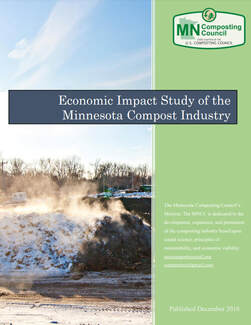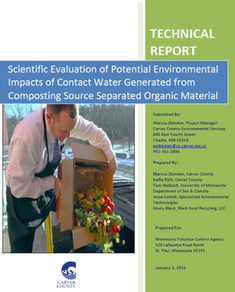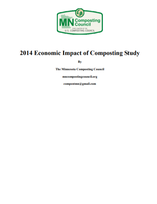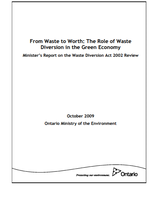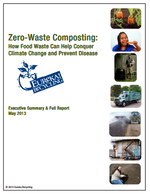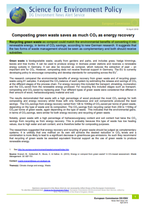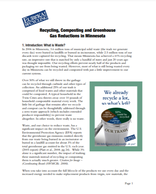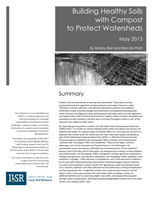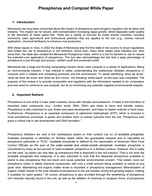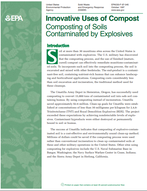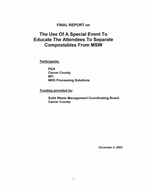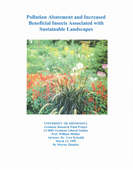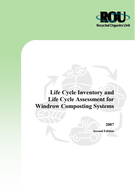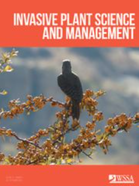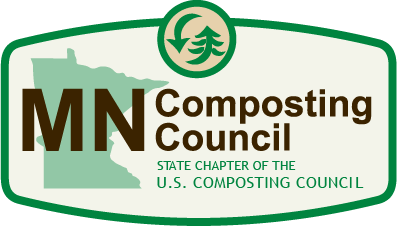Research Studies & Reports
Disclaimer: Periodically, reports not written by the MNCC are published on this web page. These reports are of general interest to our membership and broader community. They do not necessarily reflect the positions of the MNCC or the views of its board of directors. For the positions of the MNCC, please visit our Advocacy web page.
Economic Impact Study of the Minnesota Compost Industry
|
The MNCC has released several Composting Industry Economic Impact studies. The most recent is 2021, but we are working to update this as we speak!
The study dives into the composting world and takes a comprehensive look at the economic impact and economic growth potential of Minnesota's composting industry. With direct comparisons drawn between recent data and data gathered in the MNCC's 2014 Economic Impact Survey, these results showcase the vibrant, growing compost industry in Minnesota. |
Perfluorooctane Sulphonate (PFOS) and Perfluoroctanoic Acid (PFOA)
Scientific Journals
Input characterization of perfluoroalkyl substances in wastewater treatment plants: Source discrimination by exploratory data analysis. (Elsiver - IWA Water Research)
Metagenomic analysis of soil microbial community under PFOA and PFOS stress. (Elsever-Environmental Research)
PFAS concentrations in soils: Background levels versus contaminated sites. (Science of the Total Environment)
Fate and transport of per- and polyfluoroalkyl substance (PFAS) n the vadose zone. (Science of the Total Environment)
Metagenomic analysis of soil microbial community under PFOA and PFOS stress. (Elsever-Environmental Research)
PFAS concentrations in soils: Background levels versus contaminated sites. (Science of the Total Environment)
Fate and transport of per- and polyfluoroalkyl substance (PFAS) n the vadose zone. (Science of the Total Environment)
Articles and other information
Revealed: more than 120,000 US sites feared to handle harmful PFAS ‘forever’ chemicals. (The Guardian October 17 2021)
Avoiding Hidden Hazard - A Purchaser's Guide to Safer Foodware. (Center for Environmental Health)
BPI: Position on Fluorinated Chemicals.
MPCA PFAS Blueprint
EPA Administrator Ragav Announces Comprehensive National Strategy to Confront PFAS Pollution (Waste Advantage)
Avoiding Hidden Hazard - A Purchaser's Guide to Safer Foodware. (Center for Environmental Health)
BPI: Position on Fluorinated Chemicals.
MPCA PFAS Blueprint
EPA Administrator Ragav Announces Comprehensive National Strategy to Confront PFAS Pollution (Waste Advantage)
|
Grant Project: Carver County Environmental ServicesCarver County Environmental Services received three separate grants from the Minnesota Pollution Control Agency in 2006, 2008, and 2012 to conduct research at two Demonstration Compost Sites at the University of Minnesota Landscape Arboretum in Chanhassen, Minnesota. The research goal was to begin characterization of potential environmental impacts of contact water and stormwater generated from compost facilities accepting yard waste, food scraps, and non-recyclable paper.
|
Economics of Composting
2014 Economic Impact of Compost StudyThis survey, conducted by the Minnesota Composting Council, aims to show the economic impact and economic growth potential of Minnesota's composting industry.
|
From Waste to Worth: The Role of Waste Diversion in the Green EconomyThis report contains the findings of the Ontario government review of the Waste Diversion Act and presents proposals for changes to the framework intended to foster a sustainable economy.
|
Compost & Climate Change
Zero-Waste Composting: How Food Waste Can Help Conquer Climate Change and Prevent DiseaseThis report looks at how food waste prevention along with collection, processing, and end-use applications impact a community economically, environmentally, and socially.
|
Composting Green Waste Saves as Much CO2 as Energy RecoveryThis news alert explains how recycling green waste as compost could match the environmental benefits of converting it into renewable energy.
|
Recycling, Composting and Greenhouse Gas Reductions in MinnesotaThis report looks at the impacts of Minnesota waste on climate change by explaining methane production in landfills and calculating greenhouse gas emissions under various waste diversion scenarios.
|
Compost & Soils
Building Healthy Soils with Compost to Protect WatershedsThis report explores the benefits of compost amended soils in watershed management, run-off management, and provides models for initiatives and policies utilizing compost in watershed and erosion management.
|
Phosphorous and Compost White Paper (MNCC)The purpose of this review is to provide composters and regulators with the information needed for composters and end users to continue to use compost, but to do so minimizing any potential negative environmental impacts.
|
Innovative Uses of Compost: Composting of Soils Contaminated by ExplosivesThis EPA report explores the benefits of finished compost use in effectively remediating munitions-contaminated soils.
|
Additional Compost Research and Reports
The Use of a Special Event to Educate the Attendees to Separate Compostables from MSWThis report outlines the PGA Project, which aimed to design and implement a successful system for organics recovery at special events through source separation.
Pollution Abatement and Increased Beneficial Insects Associated with Sustainable LandscapesThis report identifies the benefits associated with sustainable landscapes including nutrient abatement, decreased water flow, and conservation of native plants and pollinators.
|
Life Cycle Inventory and Life Cycle Assessment for Windrow Composting SystemsThis study focuses on the life cycle assessment of windrow composting systems to inform the management of organic materials diverted from landfill in New South Wales.
Solid Waste Policy Report 2019The MPCA's 2019 Solid Waste Policy Report lays out strategies for managing solid waste until 2022. Information regarding organics management is on pages 14-15 and 24. Recommendations are given on pages 36-37.
|
Composting Reduces Seed Viability of Garlic Mustard (Alliaria petiolata) and Common Buckthorn (Rhamnus cathartica)This research measured the viability of garlic mustard and common buckthorn seeds exposed to turned or static composting methods. Seed viability was reduced rapidly in both methods.
|

